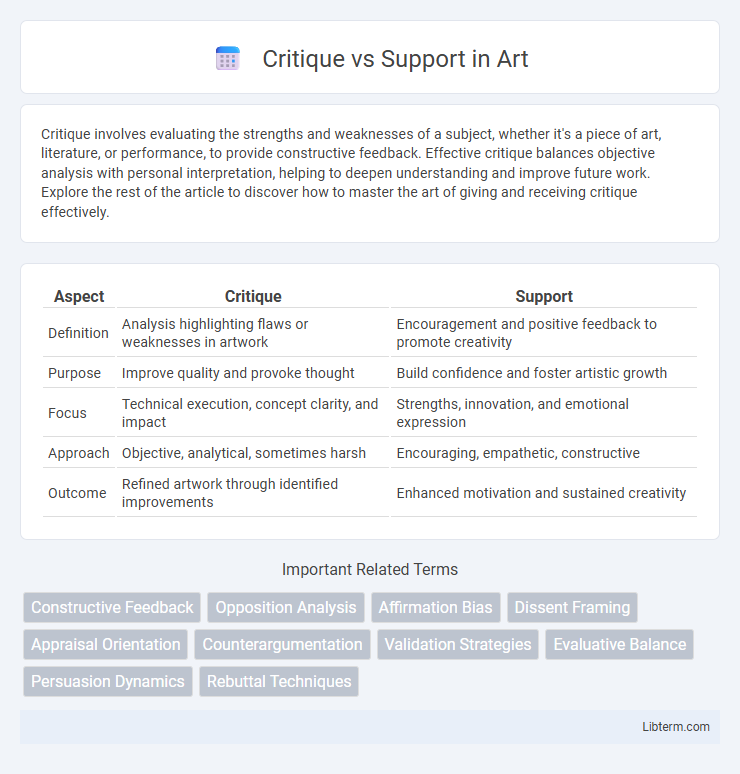Critique involves evaluating the strengths and weaknesses of a subject, whether it's a piece of art, literature, or performance, to provide constructive feedback. Effective critique balances objective analysis with personal interpretation, helping to deepen understanding and improve future work. Explore the rest of the article to discover how to master the art of giving and receiving critique effectively.
Table of Comparison
| Aspect | Critique | Support |
|---|---|---|
| Definition | Analysis highlighting flaws or weaknesses in artwork | Encouragement and positive feedback to promote creativity |
| Purpose | Improve quality and provoke thought | Build confidence and foster artistic growth |
| Focus | Technical execution, concept clarity, and impact | Strengths, innovation, and emotional expression |
| Approach | Objective, analytical, sometimes harsh | Encouraging, empathetic, constructive |
| Outcome | Refined artwork through identified improvements | Enhanced motivation and sustained creativity |
Understanding the Concepts: Critique and Support
Critique involves analyzing ideas or performances by identifying strengths and weaknesses to improve understanding or outcomes. Support emphasizes reinforcing or validating concepts through evidence, encouragement, or agreement to strengthen foundations or perspectives. Both critique and support are essential cognitive processes that foster balanced evaluation and informed decision-making in academic and professional contexts.
Historical Perspectives on Critique and Support
Historical perspectives on critique emphasize its role as a tool for social and intellectual progress, often challenging dominant paradigms and promoting reform. Support, historically, has been viewed as essential for sustaining institutions, ideas, and movements, providing stability and continuity in cultural and political contexts. The dynamic interplay between critique and support drives the evolution of societies by balancing innovation with preservation.
Key Differences Between Critique and Support
Critique involves analyzing and evaluating a subject by identifying its strengths and weaknesses, often highlighting areas for improvement or concern. Support primarily aims to reinforce or defend a viewpoint, idea, or argument through evidence and positive affirmation. The key difference lies in critique's evaluative approach versus support's affirming intent, shaping their distinct roles in discussion and decision-making processes.
The Role of Critique in Personal and Professional Growth
Critique plays a crucial role in personal and professional growth by providing objective feedback that highlights areas for improvement and encourages continuous learning. Constructive criticism fosters self-awareness and helps individuals refine skills, adapt strategies, and achieve higher performance levels. Embracing critique cultivates resilience and a growth mindset, essential for overcoming challenges and advancing career development.
The Importance of Support in Building Confidence
Support plays a crucial role in building confidence by providing encouragement and constructive feedback that fosters growth and resilience. Unlike critique, which often highlights shortcomings, support emphasizes strengths and potential, creating a positive environment for learning and improvement. Consistent support strengthens self-belief, enabling individuals to take on challenges with greater assurance and perseverance.
Balancing Critique and Support for Effective Communication
Balancing critique and support in communication enhances clarity and fosters trust within teams, leading to improved collaboration and productivity. Providing constructive feedback with specific examples while acknowledging strengths encourages receptiveness and motivates improvement. Effective communicators tailor their approach to the audience's needs, ensuring feedback is framed positively to maintain engagement and facilitate growth.
Potential Pitfalls of Excessive Critique
Excessive critique can undermine team morale by fostering a culture of negativity and fear of failure, which stifles innovation and creativity. Persistent negative feedback may lead to decreased motivation, increased stress, and reduced productivity among employees. Balancing critique with constructive support ensures a healthier work environment that promotes growth and continuous improvement.
The Risks of Uncritical Support
Uncritical support can lead to overlooking critical flaws, resulting in poor decision-making and perpetuating errors within organizations or projects. This blind endorsement increases the risk of groupthink, stifling innovation and suppressing valuable dissenting opinions essential for improvement. Emphasizing constructive critique fosters accountability and drives enhanced outcomes by identifying potential issues early and encouraging diverse perspectives.
Integrating Constructive Critique and Meaningful Support
Integrating constructive critique and meaningful support enhances personal growth by balancing honest feedback with empathy and encouragement. Constructive critique provides specific, actionable insights that help identify areas for improvement, while meaningful support fosters motivation and resilience. This synergy cultivates a positive environment where individuals feel valued and empowered to develop their skills effectively.
Strategies for Fostering a Healthy Critique-Support Culture
Establishing clear guidelines and respectful communication norms fosters a balanced critique-support culture that encourages constructive feedback and emotional safety. Implementing regular feedback training and promoting active listening skills enhances mutual understanding and reduces defensiveness. Integrating recognition of strengths alongside areas for improvement motivates continuous growth and strengthens team cohesion.
Critique Infographic

 libterm.com
libterm.com